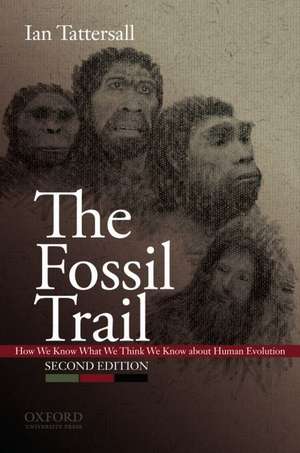The Fossil Trail
Autor Ian Tattersallen Limba Engleză Paperback – 31 oct 2008
The Fossil Trail provides an up-to-the-minute overview of paleoanthropological thought and discovery and presents our "family tree" as it is portrayed in the Spitzer Hall of Human Origins at the American Museum of Natural History.
New to the Second Edition
*Revisions throughout bring this edition thoroughly up to date
*New chapters: Chapters 17 and 18 include a discussion of the state of paleoanthropology as the first decade of the 21st century concludes and thoughts on the future of the field
*A new gallery of maps of major fossil sites, in Western Europe, Central Europe, the Caucasus and Near East, East Asia, Northern Africa, and Southern Africa
*Updated opening timeline includes the stratigraphic ranges of twenty-three hominid species
*In addition to over 90 high quality fossil renderings, new photographs illustrate new findings in the field
Preț: 605.50 lei
Preț vechi: 786.37 lei
-23% Nou
Puncte Express: 908
Preț estimativ în valută:
115.88€ • 120.53$ • 95.66£
115.88€ • 120.53$ • 95.66£
Carte disponibilă
Livrare economică 24 martie-07 aprilie
Preluare comenzi: 021 569.72.76
Specificații
ISBN-13: 9780195367669
ISBN-10: 0195367669
Pagini: 327
Ilustrații: 97 black and white line illustrations
Dimensiuni: 155 x 234 x 20 mm
Greutate: 0.5 kg
Ediția:2
Editura: Oxford University Press
Locul publicării:New York, United States
ISBN-10: 0195367669
Pagini: 327
Ilustrații: 97 black and white line illustrations
Dimensiuni: 155 x 234 x 20 mm
Greutate: 0.5 kg
Ediția:2
Editura: Oxford University Press
Locul publicării:New York, United States
Descriere
Ideal for courses in Human Evolution, History of Paleoanthropology, and as a supplement for Introduction to Biological Anthropology, The Fossil Trail is a history of paleoanthropological thought and discovery. Ian Tattersall's account of the study of human evolution offers a colorful history of fossil discoveries and a revealing insider's look at how these finds have been interpreted-and misinterpreted-through time. The second edition of The Fossil Trail brings the text up-to-datewith a look at what has happened in paleoanthropology in the thirteen intervening years since the first edition's publication. There has been not only a dramatic increase in the size and scope of the human fossil record, but the introduction of new techniques of analysis and of ways of interpretingthat record. Through it all, Tattersall discusses the great researchers and discoveries within the context of their social and scientific milieu to reveal the many forces that shape how we interpret fossil findings, and to give a picture of what lies ahead for the field. The Second Edition updates the original first fifteen chapters with the most recent research. The new edition also features a substantially revised Chapter 16, which provides a bridge to later developments about the Neanderthals and their precursors. Tattersall has also added two new chapters that cover the discoveries published over the past thirteen years. Chapter 17 launches a discussion of the state of paleoanthropology at the turn of the 21st Century, and Chapter 18 ties our most recentknowledge back to the beginning to look at where we've been and where we're headed. The author has also added a new gallery of maps of fossil sites-including Western Europe, Central Europe, The Caucuses and Near East, East Asia, Northern Africa, and Southern Africa-and updated the opening timeline toinclude the discovery of nearly 20 new species.
